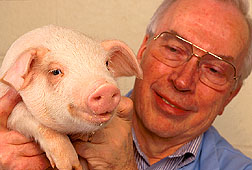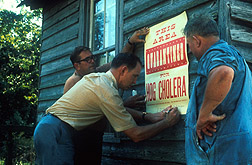This page has been archived and is being provided for reference purposes only. The page is no longer being updated, and therefore, links on the page may be invalid.
|
|
ARS Hall of Fame Inducts Three ScientistsBy Jim CoreNovember 28, 2001 BELTSVILLE, Md., Nov. 28--Pioneering research toward improving soil quality, research contributions and leadership in the field of swine viral diseases, and the development of technology for gender preselection of mammals have earned their developers places in the Agricultural Research Service Science Hall of Fame. ARS is the chief research agency of the U.S. Department of Agriculture. The inductees--soil scientist William E. Larson, swine virologist William L. Mengeling and research scientist Lawrence A. Johnson--will receive plaques citing their diverse achievements. Permanent copies of the plaques presented to the scientists will be on display at ARS' National Visitor Center in Beltsville, Md. Since 1986, the ARS Science Hall of Fame program has recognized agency researchers for outstanding career achievements in agricultural science. Those inducted are nominated by their peers for making major contributions to agricultural research. The scientists must be retired or eligible to retire to receive the honor. William Larson worked for ARS and its predecessor agency for 32 years before retiring in 1982 as the research leader at the Soil and Water Management Research Unit in St. Paul, Minn., and technical leader for Tillage/Residue Management Investigation. Larson developed a theory of soil compressibility that was used in a model used around the world to describe soil compaction resulting from farm machinery wheel traffic. Also, his studies demonstrated that biosolids could be used safely in agricultural land without contaminating food products and water. |
|
|
William Mengeling joined ARS in 1961 as a veterinary research virologist at the National Animal Disease Center in Ames, Iowa. During his early career, he developed a diagnostic test which was the primary test used in eradicating hog cholera from U.S. swine herds. The United States was declared free of hog cholera in 1978, saving the swine industry more than $100 million annually. Mengeling was the first scientist to isolate porcine parvovirus from swine in the United States. He established under both laboratory and field conditions that this virus plays a role in maternal reproductive failure of swine. Mengeling's research provides a basis for enhanced understanding of several other swine diseases, including pseudorabies and porcine reproductive and respiratory syndrome (PRRS). Lawrence Johnson developed a patented procedure, known worldwide as the USDA-Beltsville Sperm Sexing Technology, that is the only method validated for gender-preselection in mammals. This invention has given the livestock industry the ability to pre-select the gender of offspring in their livestock breeding herds for the first time. Johnson worked in Beltsville from 1964 until his retirement in January 2000 from the Animal and Natural Resources Institute's Germplasm and Gamete Physiology Laboratory. Earlier in his career, Johnson collaborated with another ARS scientist to develop the first successful method of deep-freezing swine semen for use in the commercial artificial insemination of swine. Later, he and Dutch scientists collaborated to develop a semen extender, the Beltsville Thawing Solution, that is now used for more than 15 million inseminations of swine throughout the world each year. |


